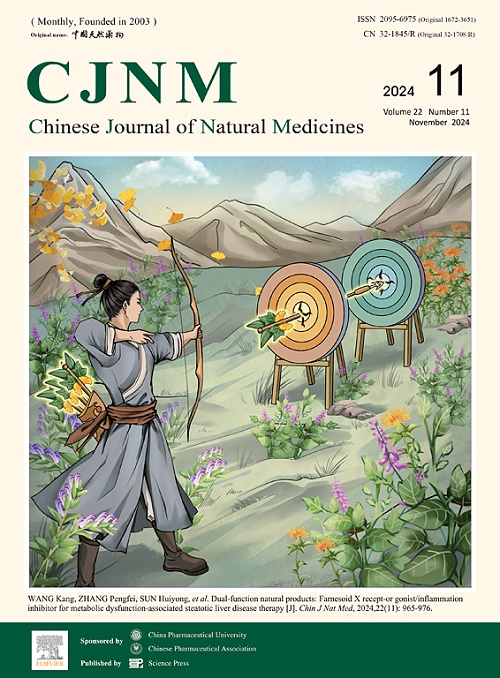Emd-D inhibited ovarian cancer progression via PFKFB4-dependent glycolysis and apoptosis
IF 4.9
2区 医学
Q1 INTEGRATIVE & COMPLEMENTARY MEDICINE
引用次数: 0
Abstract
Ovarian cancer poses a significant threat to women’s health, necessitating effective therapeutic strategies. Emd-D, an emodin derivative, demonstrates enhanced pharmaceutical properties and bioavailability. In this study, Cell Counting Kit 8 (CCK8) assays and Ki-67 staining revealed dose-dependent inhibition of cell proliferation by Emd-D. Migration and invasion experiments confirmed its inhibitory effects on OVHM cells, while flow cytometry analysis demonstrated Emd-D-induced apoptosis. Mechanistic investigations elucidated that Emd-D functions as an inhibitor by directly binding to the glycolysis-related enzyme PFKFB4. This was corroborated by alterations in intracellular lactate and pyruvate levels, as well as glucose transporter 1 (GLUT1) and hexokinase 2 (HK2) expression. PFKFB4 overexpression experiments further supported the dependence of Emd-D on PFKFB4-mediated glycolysis and SRC3/mTORC1 pathway-associated apoptosis. In vivo experiments exhibited reduced xenograft tumor sizes upon Emd-D treatment, accompanied by suppressed glycolysis and increased expression of Bax/Bcl-2 apoptotic proteins within the tumors. In conclusion, our findings demonstrate Emd-D’s potential as an anti-ovarian cancer agent through inhibition of the PFKFB4-dependent glycolysis pathway and induction of apoptosis. These results provide a foundation for further exploration of Emd-D as a promising drug candidate for ovarian cancer treatment.
Emd-D通过pfkfb4依赖性糖酵解和细胞凋亡抑制卵巢癌进展
卵巢癌对妇女健康构成重大威胁,需要有效的治疗策略。Emd-D是一种大黄素衍生物,具有增强的药物特性和生物利用度。在本研究中,细胞计数试剂盒8 (CCK8)检测和Ki-67染色显示Emd-D对细胞增殖的抑制呈剂量依赖性。迁移和侵袭实验证实了其对OVHM细胞的抑制作用,流式细胞术分析证实了emd - d诱导的细胞凋亡。机制研究表明,Emd-D通过直接结合糖酵解相关酶PFKFB4发挥抑制剂的作用。细胞内乳酸和丙酮酸水平以及葡萄糖转运蛋白1 (GLUT1)和己糖激酶2 (HK2)表达的改变证实了这一点。PFKFB4过表达实验进一步支持了Emd-D对PFKFB4介导的糖酵解和SRC3/mTORC1途径相关的细胞凋亡的依赖性。体内实验显示,Emd-D治疗后,异种移植物肿瘤体积减小,肿瘤内糖酵解抑制,Bax/Bcl-2凋亡蛋白表达增加。总之,我们的研究结果表明,Emd-D通过抑制pfkfb4依赖性糖酵解途径和诱导细胞凋亡,具有抗卵巢癌的潜力。这些结果为进一步探索Emd-D作为卵巢癌治疗的有前景的候选药物奠定了基础。
本文章由计算机程序翻译,如有差异,请以英文原文为准。
求助全文
约1分钟内获得全文
求助全文
来源期刊

Chinese Journal of Natural Medicines
INTEGRATIVE & COMPLEMENTARY MEDICINE-PHARMACOLOGY & PHARMACY
CiteScore
7.50
自引率
4.30%
发文量
2235
期刊介绍:
The Chinese Journal of Natural Medicines (CJNM), founded and sponsored in May 2003 by China Pharmaceutical University and the Chinese Pharmaceutical Association, is devoted to communication among pharmaceutical and medical scientists interested in the advancement of Traditional Chinese Medicines (TCM). CJNM publishes articles relating to a broad spectrum of bioactive natural products, leading compounds and medicines derived from Traditional Chinese Medicines (TCM).
Topics covered by the journal are: Resources of Traditional Chinese Medicines; Interaction and complexity of prescription; Natural Products Chemistry (including structure modification, semi-and total synthesis, bio-transformation); Pharmacology of natural products and prescription (including pharmacokinetics and toxicology); Pharmaceutics and Analytical Methods of natural products.
 求助内容:
求助内容: 应助结果提醒方式:
应助结果提醒方式:


